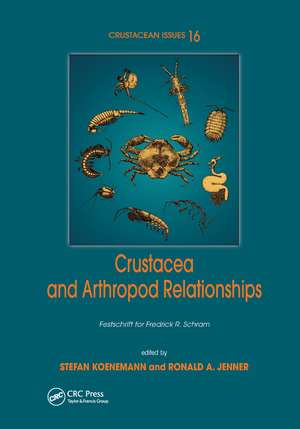Crustacea and Arthropod Relationships
Editat de Stefan Koenemann, Ronald Jenneren Limba Engleză Paperback – 2 oct 2019
Can Crustacea even be considered a monophyletic group?
If so, then which are their closest relatives within the Arthropoda?
The answers to questions such as these will play a key role in understanding patterns and processes in arthropod evolution, including the disappearance of certain body plans from the fossil record, as well as incidences of transition from aquatic to terrestrial environments.
Crustacea and Arthropod Relationships, written by a team of internationally recognized experts, presents a wide variety of viewpoints, while offering an up-to-date summary of recent progress across several disciplines. With rich detail and vibrancy, it addresses the evolution and phylogenetic relationships of the Arthropoda based upon molecular, developmental, morphological, and paleontological evidence.
Volume 16 is the first in the series to not be exclusively dedicated to discussions specific to crustaceans. While it is still crustaceo-centric, the focus of this volume has been extended to include other groups of arthropods along with the Crustacea. This wider focus offers challenging opportunities to evaluate higher-level relationships within the Arthropoda from a carcinologic perspective.
This volume is dedicated to the career of Frederick R. Schram, the founding editor of CrustaceanIssues in 1983, in recognition of his many stimulating and wide-ranging contributions to the evolutionary biology of arthropods in general, and of crustaceans in particular.
Preț: 502.17 lei
Preț vechi: 590.79 lei
-15% Nou
Puncte Express: 753
Preț estimativ în valută:
96.09€ • 104.80$ • 81.02£
96.09€ • 104.80$ • 81.02£
Carte tipărită la comandă
Livrare economică 24 aprilie-08 mai
Preluare comenzi: 021 569.72.76
Specificații
ISBN-13: 9780367392949
ISBN-10: 0367392941
Pagini: 440
Dimensiuni: 178 x 254 x 23 mm
Greutate: 0.81 kg
Ediția:1
Editura: CRC Press
Colecția CRC Press
ISBN-10: 0367392941
Pagini: 440
Dimensiuni: 178 x 254 x 23 mm
Greutate: 0.81 kg
Ediția:1
Editura: CRC Press
Colecția CRC Press
Public țintă
Professional Practice & DevelopmentCuprins
Decapoda, the K/P-event, and the Palaeocene recovery. Oelandocaris oelandica Müller, 1983, and its significance to re-solving the stemlineage of Crustacea. Evolution of eye structure and arthropod phylogeny. Appendage loss and regeneration in arthropods: A comparative view. Resolving arthropod relation-ships: insights from evo-devo studies. Heads, Hox and the position of trilobites. Relationships between hexapods and crustaceans based on mitochondrial genomics. Comparative morphology and relationships of the Agnostida. Relationships between insect and crustaceans based on 18S rDNA.
Gould, Schram, and the palaeontological perspective in Zoology. The position of crustaceans within the Arthropoda - evidence from nine molecular loci and morphology. Playing another round of metazoan phylogenetics: historical epistemology, sensitivity analysis, and the position of Arthropoda within the Metazoa on the basis of morphology. Early Palaeozoic non-lamellipedian arthropods. What are ostracods?
Gould, Schram, and the palaeontological perspective in Zoology. The position of crustaceans within the Arthropoda - evidence from nine molecular loci and morphology. Playing another round of metazoan phylogenetics: historical epistemology, sensitivity analysis, and the position of Arthropoda within the Metazoa on the basis of morphology. Early Palaeozoic non-lamellipedian arthropods. What are ostracods?
Notă biografică
Stefan Koenemann, Ronald A. Jenner
Descriere
Employing rich detail, international experts across several fields address the evolution and phylogenetic relationships of the Arthropoda. They offer innovative ideas to reevaluate the phylogeny of major groups, discuss the evolution of arthropod eyes in a phylogenetic context, present a comprehensive overview of appendage loss and regeneration, and address recent molecular phylogenetic data, including nuclear and mitochondrial DNA sequences. While it is still crustaceo-centric, the focus of this volume has been extended to include other arthropods. This wider focus offers challenging opportunities to evaluate higher-level relationships within the Arthropoda from a carcinologic perspective.
